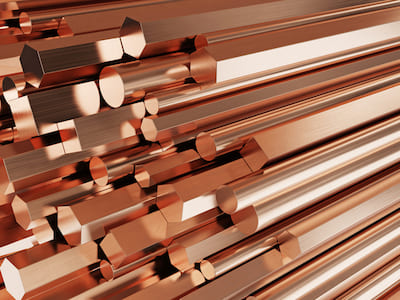Checking Out the Diverse Applications of Copper Products in Modern Industries
From boosting the efficiency of electric systems to playing an important duty in renewable energy modern technologies, the flexibility of copper is obvious. As sectors increasingly prioritize technology and sustainability, the diverse applications of copper require a closer assessment, specifically regarding their prospective effect on future ecological techniques and technological improvements.
Electric Applications of Copper
Copper is an essential material in the electrical industry, accounting for roughly 60% of the overall demand for non-ferrous metals internationally - Copper Products. Its premium electric conductivity, which is nearly two times that of light weight aluminum, makes it the favored choice for a large range of electric applications. From circuitry systems in business and property buildings to high-voltage power transmission lines, copper guarantees effectiveness and integrity in electrical energy shipment
In addition to circuitry, copper is essential to the manufacturing of electric elements such as electric motors, generators, and transformers. These elements leverage copper's thermal conductivity and pliability, crucial for warm dissipation and reliable efficiency. Copper's resistance to corrosion boosts the life expectancy and longevity of electrical systems, making it an economical service in the lengthy term.
The growth of sustainable power resources, such as solar and wind power, has additionally raised the need for copper in electric applications. As industries shift in the direction of sustainable energy options, copper's function becomes even much more important. On the whole, the convenience and efficiency features of copper solidify its condition as a foundation material within the electrical sector, driving innovation and performance throughout various applications.
Plumbing and Piping Solutions
In modern-day pipes systems, the selection of products significantly impacts both performance and durability. Copper has actually become a recommended alternative due to its unique residential or commercial properties, including corrosion resistance and antimicrobial qualities. These qualities make certain that copper piping continues to be risk-free and durable for delivering safe and clean water, an important factor to consider in domestic and business applications.
Among the essential benefits of copper in pipes is its capacity to stand up to heats and pressures, making it appropriate for a variety of applications, from warm water systems to home heating and cooling down networks. In addition, copper's flexibility permits much easier installation in intricate piping designs, minimizing the threat of failures and leaks.
Another noteworthy advantage is copper's lengthy life-span, often going beyond 50 years with proper maintenance. This durability not just lessens replacement costs but also adds to lasting practices by lowering waste. Copper's recyclability straightens with modern ecological criteria, promoting a circular economic situation within the plumbing industry.
Copper in Renewable Power
The adaptability of copper extends past pipes applications, playing an important function in the eco-friendly energy field. In solar panels, copper is used in solar cells and wiring, facilitating effective power conversion and transmission.

Moreover, as the global demand for electrical cars (EVs) boosts, copper's duty in battery systems and billing framework comes to be much more significant. The material's capability to conduct electrical power efficiently is integral to the efficiency of EV batteries, improving array and charging speed.
Copper's Role in Electronics
Electronic devices producing counts greatly on copper's remarkable buildings, specifically its high electric conductivity and thermal efficiency. These qualities make copper a suitable choice for a wide variety of electronic parts, including connectors, motherboard, and wiring. The steel's go right here capability to efficiently send electric signals makes sure very little energy loss, which is critical in high-performance electronic devices.
Furthermore, copper's thermal conductivity plays a considerable duty in heat dissipation, shielding sensitive parts from overheating. This is specifically vital in modern-day electronics, where portable layouts bring about enhanced warm generation. Copper is also preferred for its pliability and ductility, enabling it to be easily formed right into elaborate styles that meet the demands of innovative electronic applications.
With the increase of customer electronics, telecoms, and electric cars, the demand for copper in the electronics market remains to grow. As innovations in technology develop, copper remains important to attaining higher performance and integrity in electronic products. Its recyclability even more improves its allure, as manufacturers look for sustainable solutions without compromising high quality. Thus, copper stays a keystone material in the ever-expanding field of electronics.
Ingenious Makes Use Of in Production

One notable application remains in additive production, where copper-based materials Our site are used in 3D printing processes. This permits the development of intricate geometries and light-weight elements, especially in the aerospace and auto fields. In addition, copper's thermal conductivity makes it an ideal option for warmth exchangers, improving performance in industrial cooling systems.
Moreover, the increase of clever manufacturing has seen the incorporation of copper in IoT gadgets, where its conductive capacities support innovative picking up innovations. In the world of renewable resource, copper is crucial in the manufacturing of photovoltaic panels and wind turbines, helping with extra effective energy conversion and circulation.
As industries make every effort for sustainability and development, copper's adaptability and performance proceed to position it as an important material, driving advancements in production and adding to the growth of smarter, more efficient items.
Verdict
The essential role of copper in eco-friendly power and its vital function in electronics highlight its relevance in advancing lasting techniques. Collectively, these applications highlight copper's crucial contribution to technical development and industrial performance in modern society.
From improving the efficiency of electric systems to playing a vital function in renewable power modern find out technologies, the convenience of copper is noticeable. As sectors progressively prioritize technology and sustainability, the varied applications of copper necessitate a closer examination, specifically regarding their possible impact on future environmental techniques and technological innovations.
The growth of sustainable power resources, such as solar and wind power, has actually even more raised the demand for copper in electric applications. On the whole, the convenience and efficiency qualities of copper strengthen its status as a foundation product within the electrical market, driving technology and performance across numerous applications.
The versatility of copper prolongs past plumbing applications, playing a vital function in the eco-friendly power sector.